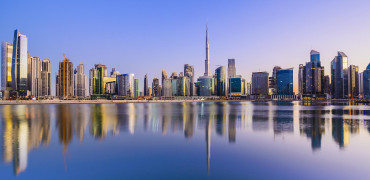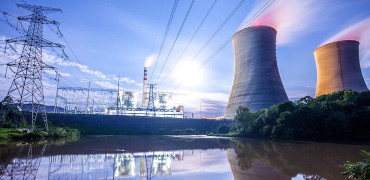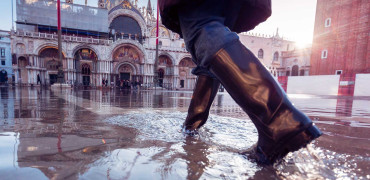The latest instalment in the greatest climate show on Earth, COP28 has finally reached its gripping climax in Dubai.
Now that the final scenes have played out and the first reviews are in, Jim McClelland asks the critical question: Did the drama deliver, or disappoint?
Like some long-running TV drama, the COP show came back for Season 28, with a new shooting location, change in lead actor, plus fresh faces amongst both cast and crew.
The setting for the latest series was a host nation that has built its wealth on fossil fuels, the United Arab Emirates (UAE).
All episodes were to be shot in that jewel in the crown of conspicuous consumption, Dubai.
As a trailer, this was not well received by the fans.
This represents the first time that fossil fuels have explicitly been identified as part of the problem
A miscast lead?
Dampening expectations still further, star billing for 2023 went to Dr Sultan Al Jaber — an actor some critics considered miscast, as he is best known worldwide for his day-job role as Managing Director and Group CEO of the Abu Dhabi National Oil Company.
For the crowd scenes, the rollcall of extras also looked decidedly different this time, with the oil lobby particularly well represented, backed by a vocal chorus of climate deniers.
Despite the doubts, however, a huge and loyal global audience tuned-in for the show.
So, what’s the verdict: Did COP28 deliver, or disappoint?
A strong start
Well, the programme certainly started strongly…
(Highlights reel weeks one and two …)
On day one, the show picked up the storyline around Loss and Damage (begun the year before) and moved the action forward significantly by operationalising this Fund, which is designed to help compensate countries harmed by the impacts of climate change.
The UAE itself led the way by announcing that it will commit $100M to the Fund, followed by other notable contributions from countries including Germany ($100M), the UK (£40M for the Fund and £20M for other arrangements), Japan ($10M) and the US ($17.5M).
(The highlights reel then continued to stream through weeks one and two…)
- Heads of State agreed to triple global renewable energy capacity by 2030, aligning with the International Renewable Energy Agency (IRENA) call to action in the second volume of its influential World Energy Transitions Outlook (WETO) 2023 released last month.
- The Global Methane Pledge (Ministerial) was made to tackle the greenhouse gas with over 80 times more global warming impact than CO2. The Pledge backs transformational national actions and catalytic grant funding towards the goal of at least 30% cuts by 2030.
- More than 60 countries, from Antigua and Barbuda to Zimbabwe, signed up to the Global Cooling Pledge, following publication of Global Cooling Watch 2023 by the United Nations Environment Programme (UNEP). This landmark report includes modelling of a dramatic rise in global demand for cooling (of buildings and cold chains for food and vaccines), as well as surveys of existing solutions in 192 countries, plus policy work towards 2050.
- The Battery Energy Storage Systems (BESS) Consortium was launched by the Global Energy Alliance for People and Planet (GEAPP) and partners, securing commitments from more than 10 countries to deploy at least 5GW of capacity by the end of next year (2024).
- The built environment sector also stepped into the spotlight with a trio of launches for the Buildings Breakthrough, Cement & Concrete Breakthrough, and Greening Construction with Sustainable Wood initiative from the Forest and Climate Leaders' Partnership (FCLP).
Script changes and suspense
Ultimately though, after all the love scenes and stage fights, the critical success or failure of this nail-biting narrative was always going to depend on the dénouement, the finale.
It is OK to leave your audience wanting more (in first Azerbaijan, then Brazil) but, to avoid getting cancelled, the COP show still had to give them (enough of) what they want.
So, the suspense began to build as the season lurched towards its end scene.
The writing proved weak, though. The pace was uneven, and the first draft of the last script read poorly.
Key members of the global cast were unhappy with their lines and called for direction.
Then, just as the audience started getting restless in their seats, the show’s barnstorming big moment was duly delivered, as villains turned out to be heroes in a pivotal plot twist.
Or, at least something like that…
An ending in a beginning
Early on in proceedings, we had witnessed heated debates about whether the finished version of the text might include talk of fossil fuels being either ‘phased out’, or ‘down’.
In the end, the dialogue that was agreed upon only committed all parties to "transitioning away from fossil fuels in energy systems, in a just, orderly and equitable manner”.
Whilst this language seems watered down, it nevertheless represents the first time that fossil fuels have explicitly been identified as part of the problem for Net Zero 2050. It is a compromise, but loosely in keeping with the science and findings of the Global Stocktake.
The writing is finally on the wall for fossil fuels and this outcome marks the ‘beginning of the end’, said UN Climate Change Executive Secretary Simon Stiell, in his closing speech.
Not everybody clapped their hands as the credits rolled, but it could have been worse.
Recorded live and reliant on improv, COP28 could have turned into a tragedy of global proportions. Instead, it served up a surprisingly feel-good, chaotic and cathartic drama.
So, until next time, in Azerbaijan 2024, it’s COP over, not out.
That’s all for now, folks!
Jim McClelland is a sustainable futurist, editor, journalist and speaker




